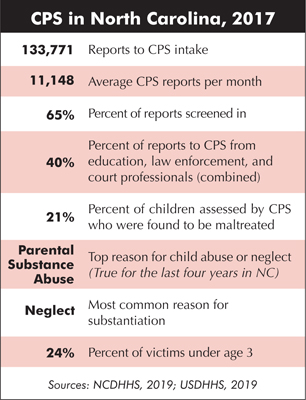 |
 |
 |
Vol.
25, No. 1
November 2019
Intake: A Critical Part of Assessing and Ensuring the Safety of NC's Children and Youth
As the "front door" to the child welfare system, intake is one of the most important roles in child welfare. Intake is where the child protection process begins. It is where the first assessment of safety and risk occurs. All subsequent intervention depends on the quality of information obtained at intake (Casey Family Programs, 2018a).
Intake is also where we have an opportunity to educate the community about our goals of ensuring safety, permanency, and well-being for all children. It is where the public gets its first impression of the child welfare system.
Despite intake's importance, we sometimes underestimate the skill it requires. Intake is not simply listening to the reporter and recording the information they provide. Intake requires the skillful gathering of information from the reporter and agency records to:
- Identify and locate the child, parents, or primary caretaker;
- Determine whether the report meets the statutory guidelines of abuse, neglect, and dependency;
- Assess the seriousness of the child's situation; and
- Understand the reporter's motives and relationship to the family (NCDSS, 2017b).
Obtaining this level of information calls for strong interviewing skills, documentation skills, and a thorough knowledge of state policy and Chapter 7B of the Juvenile Code. After they gather this information, intake staff face myriad decisions (NCDSS, 2017b):
- What maltreatment type is alleged?
- Do we screen this report in or out, per our legal definitions and policy?
- Will this be a Family Assessment or Investigative Assessment?
- Must the response be immediate, 24 hours, or 72 hours?
These decisions must be made quickly, so that accepted reports can be assigned to a CPS assessor and initiated timely. Intake staff make these decisions with their supervisor, but the supervisor relies on the information obtained through the interviewing techniques of the worker. Intake workers must have excellent critical thinking and decision-making skills.
Furthermore, intake workers must have strong customer service skills, for they are a reflection of the child welfare system. The reporter's first contact with intake is an opportunity for the agency to "demonstrate its values in action and the seriousness with which it approaches its role and responsibility within the community" (Casey, 2018a). Making a CPS report is a big step and can be hard, especially for reporters who have a relationship with the family. Reporters need support and encouragement for deciding to make the report, and intake has to address their fears and concerns (Capacity Building Center for States, 2018). Intake must also be ready to educate the reporter about the CPS process and next steps. We must respond with care, concern, a sense of urgency, and appreciation for the allegations being shared (Casey, 2018a).
Finally, intake is emotionally heavy work. Intake staff receive reports of abuse and neglect all day, every day, without knowing what happens to each child and family. They rarely get to see successes. They don't get to see families reunify. They don't get to initiate a case to see if the allegations are unfounded. They don't get to experience case closure. Managing the emotional toll of intake is a skill in itself.
To sum up, CPS intake staff must simultaneously gather information, calm the reporter, manage themselves, and make a host of decisions quickly. That is a tall order!
Fortunately, we have a host of tools to help intake do these things well. The intake policy, structured intake form, maltreatment screening tools, and decision trees are meant to support the intake process. These tools help ensure we make legally sound, consistent decisions about whether the agency must make contact with the family, based on the safety concerns identified in the report (NCDSS, 2017b).
Conclusion
CPS intake is an incredibly challenging job--one that has long-lasting implications, for both the child welfare system and the families and children we serve. Intake staff, we thank you for your skilled work and assistance in ensuring safety and well-being for children and families in North Carolina!
Click here for more about how a thorough intake helps all child welfare service areas. |

